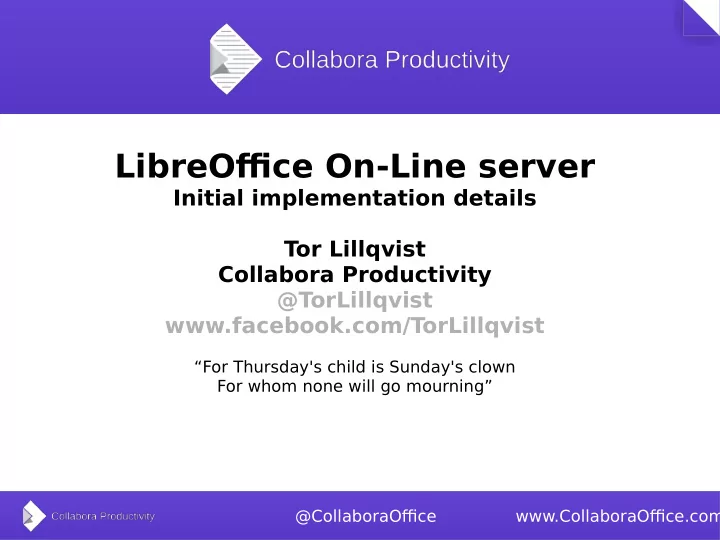

LibreOffjce On-Line server Initial implementation details Tor Lillqvist Collabora Productivity @TorLillqvist www.facebook.com/TorLillqvist “For Thursday's child is Sunday's clown For whom none will go mourning” @CollaboraOffjce www.CollaboraOffjce.com
Goals ● Client: any modern web browser ● Server: Linux, but don't be more platform- dependent than necessary ● Simple protocol over WebSocket ● Layered security to guard against vulnerabilities in LibreOffice or 3 rd -party code
Basics ● WebSocket: A simple message-oriented full-duplex protocol over TCP ● Session starts as normal HTTP but switches immediately after handshake to WebSocket
Basics ● LOOL server process(es) isolated from rest of system ● One process per client session ● Isolation between client sessions
Basics ● LOOL server code uses LibreOffice functionality through LibreOfficeKit ● No separate LibreOffice process(es) ● No LibreOffice APIs used directly in the server ● No UNO ● Which is good
Basics ● Tiles sent to client are kept cached for a while ● In case same parts of document viewed later, no LibreOfficeKit instance needed
LibreOffjceKit ● A very simple C & C++ API for LibreOffice ● Exposes the core value of LibreOffice ● File format filters ● Tiled rendering (converting documents to pixels) ● Editing, selections etc ● A very simple ~header-only API – no linking ● Fully abstract: fn pointers, opaque structs etc ● No sockets opened, no plugins / simple init ● Global error messages ● Used also by Android app and loconv
But ● Most of the LibreOfficeKit functionality used is “unstable” ● Whenever new features are added to client-side LOOL, it likely requires bleeding-edge LO on the server ● Not really ideal, but unavoidable
POCO ● Looked for suitable WebSocket implementation ● Found POCO: http://pocoproject.org ● Relatively clean C++ code ● (Not that I am any connoisseur) ● Lots of utility classes for various commonly needed functionality
POCO ● Availability in popular distros lagging behind by several versions. Looking at you, Debian ● Significant overlap with functionality already in the standard C++11 library ● Presumably POCO intends to be usable also with older C++ implementations ● But we require C++11 for LibreOffice anyway ● Obviously, prefer to use std:: and not POCO when possible
POCO ● In addition to WebSocket, for instance also classes for HTTP server and client functionality, easy to use ● Using POCO omehow makes your code look a bit like Java, in a good sense ● In general I have been quite happy with it
LOOL protocol ● Not strict request-response, but asynchronous, full-duplex. Initially planned to be as stateless as possible ● Mostly human-readable and verbose ● First (and usually only) line of WebSocket messages is completely ASCII ● First line can be followed by more (perhaps binary) data
LOOL protocol ● One document open per client session ● New session required to switch to another document ● Tiles returned as PNG-compressed pixmaps
Security ● Layered security ● Chroot jail for each session ● Chroot requires privileges: Use Linux capabilities, not setuid root ● Drop capability immediately when no longer needed ● But anyway, for production, probably want to use some container technology
FIN “People respected one if one didn’t talk. They believed that one knew a great many things and led a very exciting life.” git://anongit.freedesktop.org/libreoffice/online Thanks to IceWarp for funding this work Technical questions welcome
Collabora ● Collabora Ltd. ● Leading Open Source Consultancy ● 10 years of experience. 90+ People. ● Collabora Productivity Ltd. ● Dedicated to Enterprise LibreOffice ● Provides Level-3 support (code issues) to all Novell / SUSE LibreOffice clients ● Architects of Microsoft OpenXML filters
Recommend
More recommend